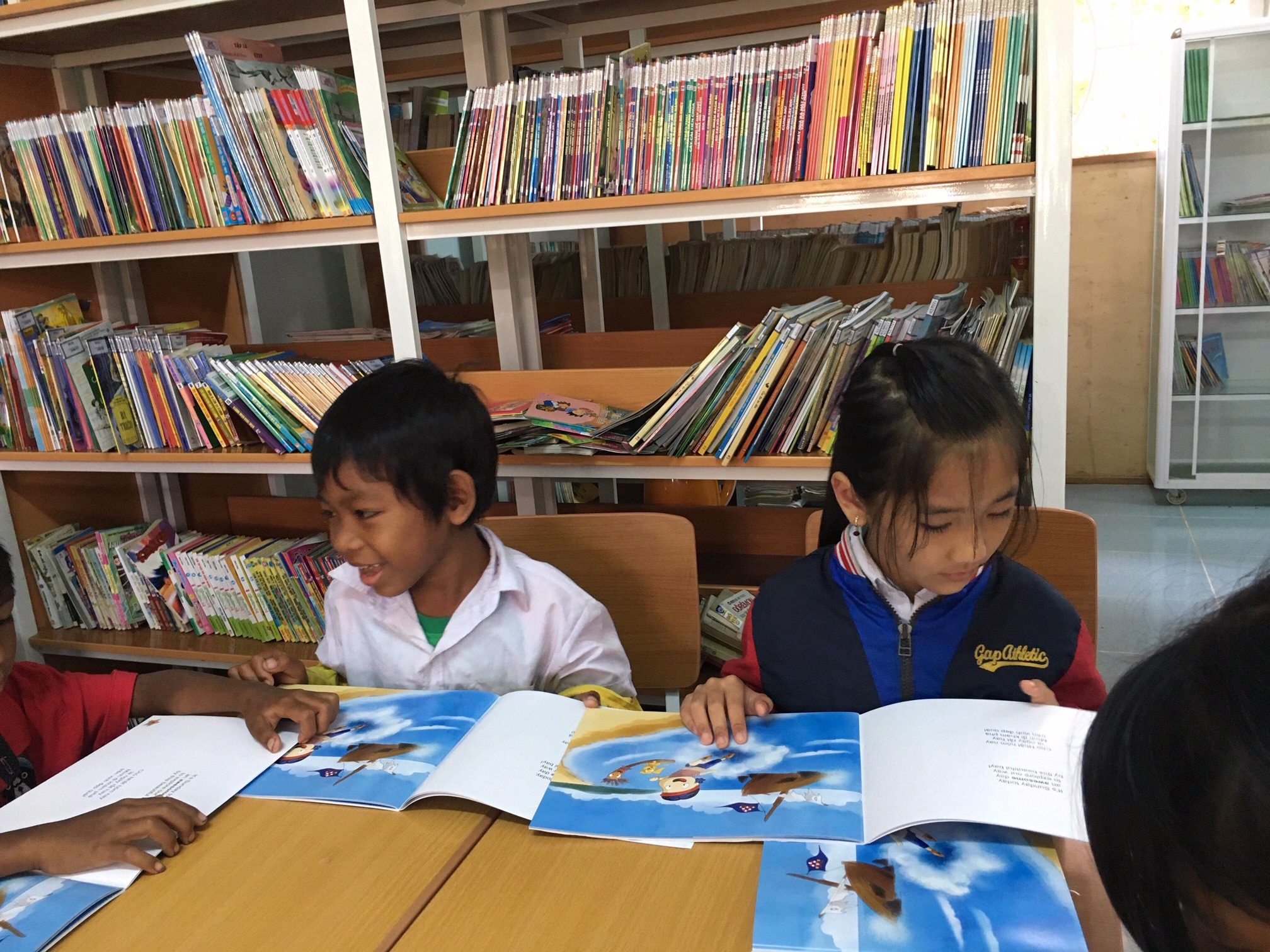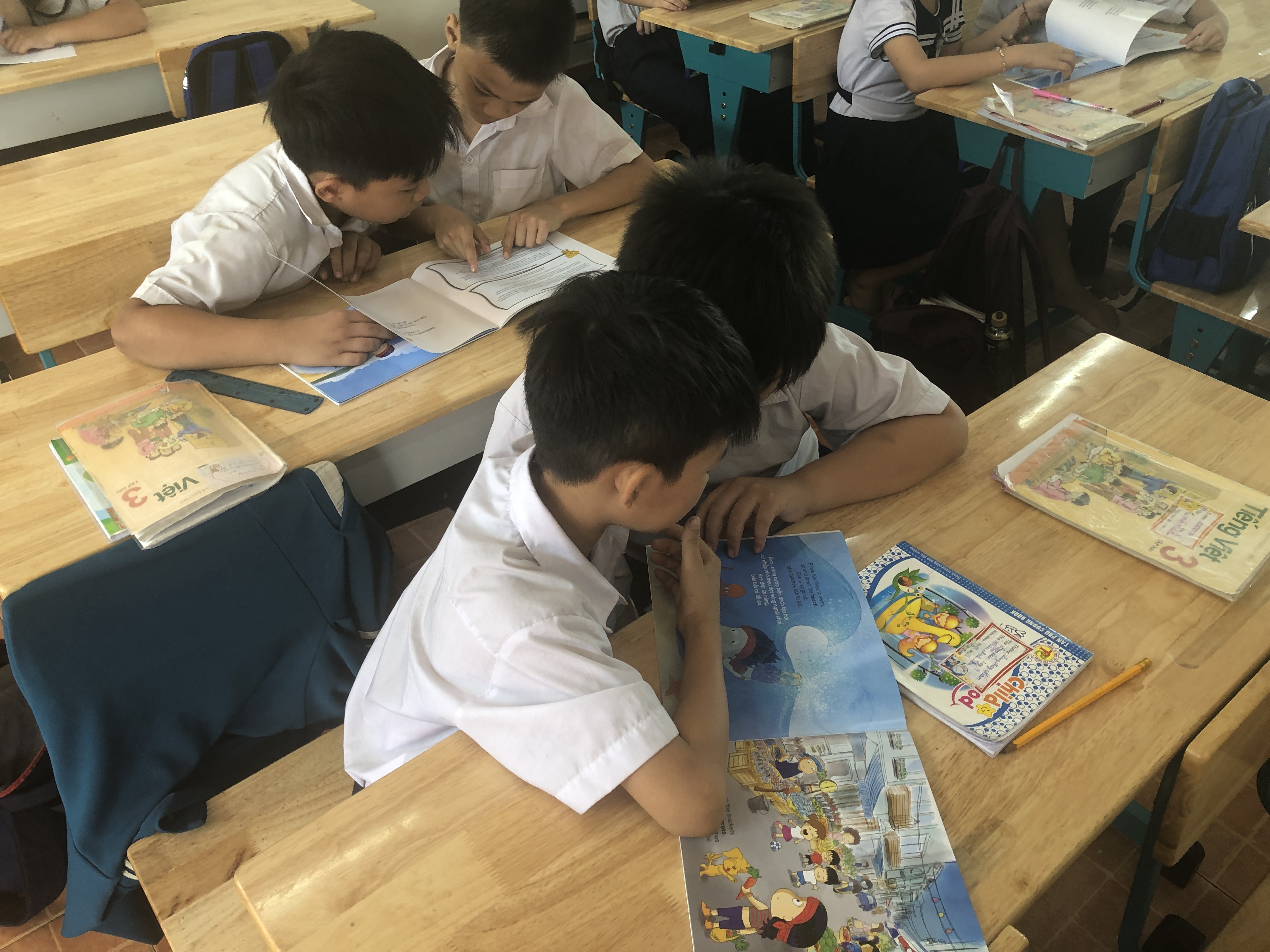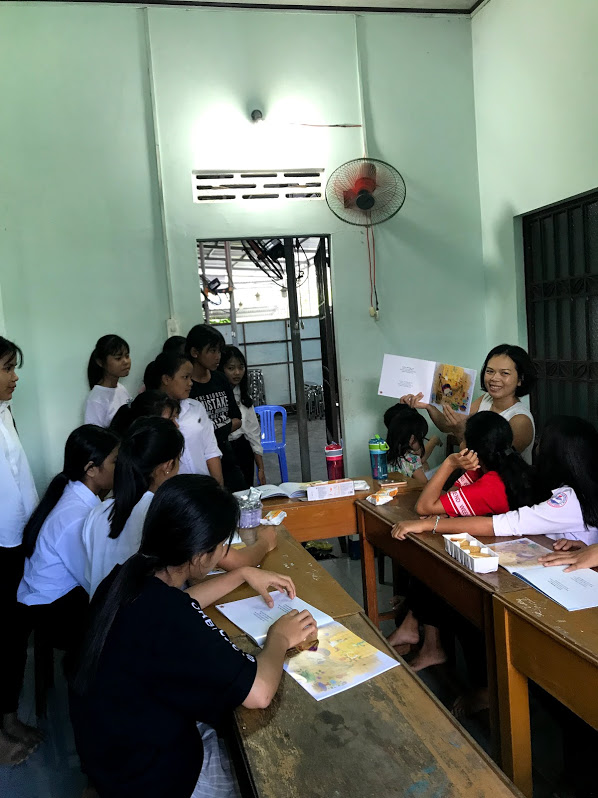For a foreigner, trying to publish a book in Vietnam is like going to the dentist every day for a month.
So here’s a bit of a story for you…
Pirate Kim, a bilingual illustrated children’s book teaching water safety, is the brainchild of Ms Thu-Trang Maria Tran, Ms Annie Duncan, Mr Garry Godfrey, all Australians, and Ms Trinh-Thuc Ha, Vietnamese.
Starting in 2018, they raised funds for the book encouraged by the ‘Our Words Our Worlds Books’ initiative to create diverse bilingual books to help children not only learn to read but also learn about other languages and cultures.
To date they have published a thousand copies of Pirate Kim and fundraised for more copies to be produced in the near future. It was printed and distributed in Vietnam.
|
|
| Boy & boy at desk: Maison Chance HCMC |
I found out about the book through a Facebook promotion and contacted Tran. She wrote up a longish account, which I’ve quoted from and edited, of how the book came to life:
“I wanted my kids to see picture books of Vietnamese-Australian lives in Melbourne. “A day with John”, if it was written by me, would not only involve going on a road trip to the beach, but we finish up at a Pho restaurant at night before we get tucked into bed. Why didn’t we have these stories on the bookshelves?
I asked my cousins from Vietnam to send some over from Vietnam, but alas, the Vietnamese myths were written in a zombie way, and the English translations were authored by Google Translate I believe. It annoyed me that bad English was being taught to Vietnamese kids, and that the beautiful Vietnamese language could not be captured and shared with kids.
And so in 2018, on a family sabbatical holiday/sea change from Melbourne to Nha Trang for a few months, I decided to use the quiet time to have a go at self-publishing an illustrated children’s English-Vietnamese book. I just needed an experienced writer, an illustrator, a printer, and some money…”
As she would discover, not that easy to accomplish; I drew and wrote a kids’ book about Vietnam (in English) myself about three years ago and made some serious and costly mistakes myself at the printing stage. So I know the pain! She formed a team of three; a retired experienced English writer (not for children’s books by admission), a published Vietnamese author who took Vietnamese literacy studies in her younger days, and herself.
“…The summer months in Nha Trang meant hearing of and reading about drownings. Despite the seaside location, I found out many schools did not offer basic water safety skills. So we had three (aims): cultural diversity, promoting literacy and bilingualism, and water safety.
Writing is about style, and the style of children’s books in English is very different from that of the books in Vietnamese. Vietnamese books are heavy-handed and didactic in their straightforward storytelling. Literary devices and made-up worlds like those employed by Dr Seuss are rare.
We were lucky for the most part; we could pull in help and expertise from around Vietnam and the world. We were unlucky that publishing has its own industry-speak and practices, not only in English, let alone Vietnamese. ‘CMYK’ colors, ‘bleeds’, tripartite publishing and printing contracts and government permits would challenge any publisher working across English-Vietnamese, let alone a first timer self-publisher.”
|
|
| Reading in class with Ms Tran: Suoi Cat girl's school, Khanh Hoa. Photo: Ngoc Le |
At this point, Tran and the group found Ms Duncan (in Hong Kong) to do the illustrations. They started fundraising on Kickstarter and successfully got enough money to begin the writing and drawings. Yet the next step would be arduous:
“There are steps that we don’t usually think of (in) editing and book design. It is itself a form of craft and is excruiatingly detailed. It involves researching and planning the front and back matters and activities often found in children’s books, designing the book cover, laying out the text and illustrations, planning the page turns, proofing the images (resolution, colours), proofing the text, double-checking the translations (a step I think current bilingual books in Vietnam really need to pick up their game), down to the fine print about the book and publisher’s details that no one ever reads.
At the final proofing stages, the pages are arranged out of order (for reading), but ordered for printing, that is, page 32 goes with page 1, page 31 goes with page 2, and so on. This makes it easy for errors to be missed, and for pictures and text out to be placed out of alignment.
All this before it goes to the printer.”
Unlike Western countries, where publishing is a relatively straightforward matter, Vietnam’s laws make it all a bit harder. Back to Tran’s account:
“Book printing/publishing is regulated, and like most things in Vietnam, one needs to get a permit by the relevant authority to do the said thing.”
But it did become a success and is currently being distributed to schools and libraries in Australia and Vietnam. Tran had other suggestions such as using ‘Print on demand’ services as an alternative to her publishing path, “…A strong writing-illustration partnership really helps to bring a story alive…” and “…Enjoy learning, whatever may come your way. In Vietnam, some new random step seems to crop up just as you think you completed one.”
If you would like to nominate a disadvantaged school in Vietnam to receive a copy of the book please contact: trang@kitadelta.com.




















































